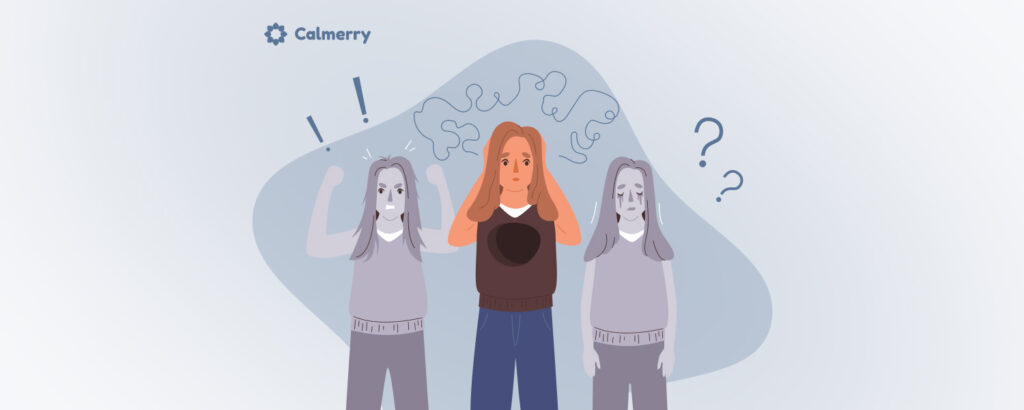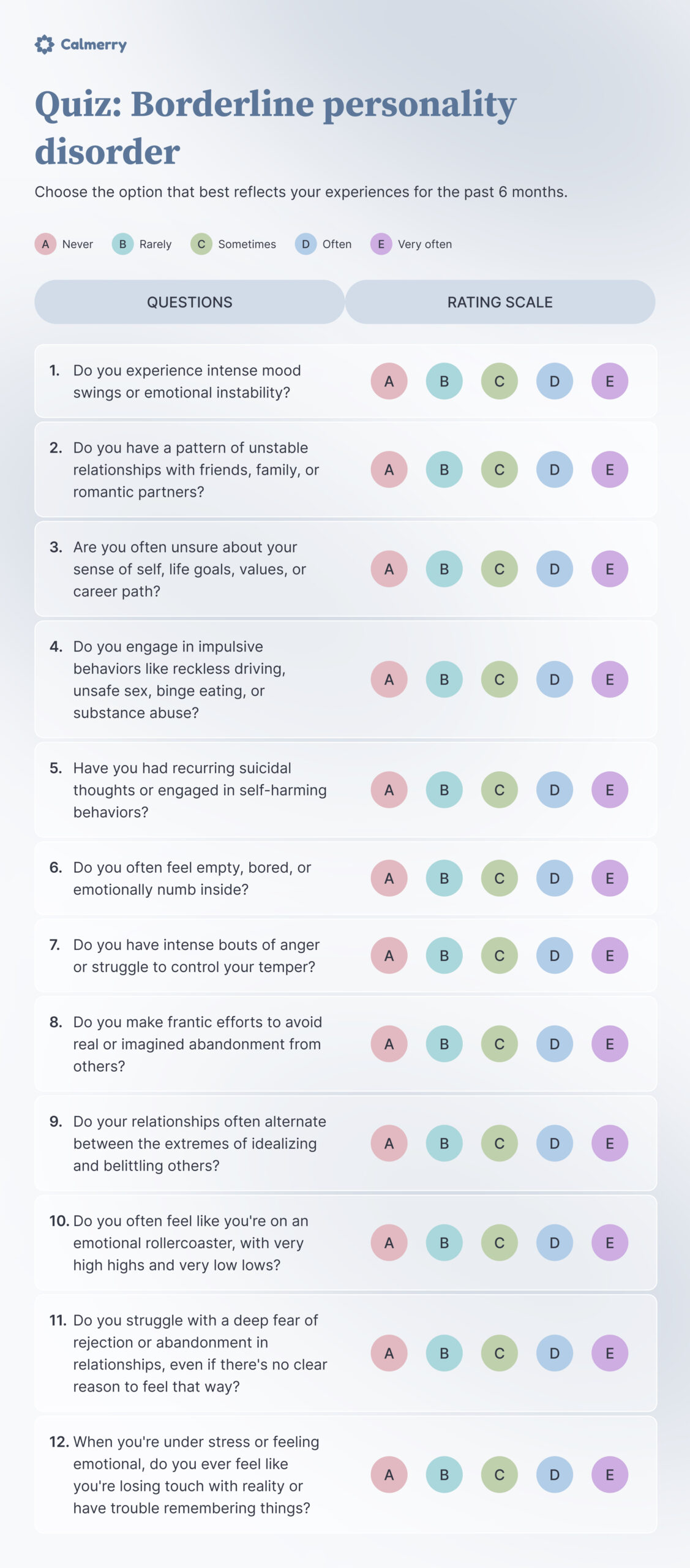Borderline Personality Disorder Test

In this article
Do you often feel extremely overwhelmed by emotions, struggle with relationships, or question your self-worth?
While these experiences are common, if they significantly impact your daily life, it may be helpful to explore whether borderline personality disorder (BPD) could be a factor.
Our simple quiz with 12 questions can provide some initial insights.
Who is the quiz for?
This quiz is for adults who are wondering if their thoughts, feelings, and behaviors might align with symptoms of BPD.
It’s a starting point for self-reflection and understanding, not a replacement for a professional diagnosis.
Is the quiz accurate?
This quiz is a tool for self-reflection, not a substitute for a professional diagnosis. While it draws from common experiences and symptoms associated with BPD, everyone’s situation is unique.
Consider this quiz a first step in understanding yourself better. If the results resonate with you, it might be helpful to discuss your thoughts and feelings with a mental health professional. They can provide personalized guidance and support tailored to your specific needs.
How to take the quiz
For each question, select the answer choice that best matches your experiences over the past several months.
After completing the quiz, take a moment to reflect on your responses. While no specific score indicates BPD, looking at patterns in your answers can provide insight into your experiences. [1] Borderline Personality disorder. (n.d.). National Institute of Mental Health (NIMH). https://www.nimh.nih.gov/health/topics/borderline-personality-disorder

BPD test
1) Do you experience intense mood swings or emotional instability?
A. Never
B. Rarely
C. Sometimes
D. Often
E. Very often
2) Do you have a pattern of unstable relationships with friends, family, or romantic partners?
A. Never
B. Rarely
C. Sometimes
D. Often
E. Very often
3) Are you often unsure about your sense of self, life goals, values, or career path?
A. Never
B. Rarely
C. Sometimes
D. Often
E. Very often
4) Do you engage in impulsive behaviors like reckless driving, unsafe sex, binge eating, or substance abuse?
A. Never
B. Rarely
C. Sometimes
D. Often
E. Very often
5) Have you had recurring suicidal thoughts or engaged in self-harming behaviors?
A. Never
B. Rarely
C. Sometimes
D. Often
E. Very often
6) Do you often feel empty, bored, or emotionally numb inside?
A. Never
B. Rarely
C. Sometimes
D. Often
E. Very often
7) Do you have intense bouts of anger or struggle to control your temper?
A. Never
B. Rarely
C. Sometimes
D. Often
E. Very often
8) Do you make frantic efforts to avoid real or imagined abandonment from others?
A. Never
B. Rarely
C. Sometimes
D. Often
E. Very often
9) Do your relationships often alternate between the extremes of idealizing and belittling others?
A. Never
B. Rarely
C. Sometimes
D. Often
E. Very often
10) Do you often feel like you’re on an emotional rollercoaster, with very high highs and very low lows?
A. Never
B. Rarely
C. Sometimes
D. Often
E. Very often
11) Do you struggle with a deep fear of rejection or abandonment in relationships, even if there’s no clear reason to feel that way?
A. Never
B. Rarely
C. Sometimes
D. Often
E. Very often
12) When you’re under stress or feeling emotional, do you ever feel like you’re losing touch with reality or have trouble remembering things?
A. Never
B. Rarely
C. Sometimes
D. Often
E. Very often
How to understand your results
If you find that you’ve selected “Often” or “Very often” for many of the questions, it may suggest that some of the symptoms and challenges associated with BPD are significantly impacting your life.
This could be a sign to further explore these feelings and behaviors with a mental health professional.
If most of your responses were “Never,” “Rarely,” or “Sometimes,” it’s less likely that BPD is a primary concern.
However, if certain questions still resonate with you or you’re experiencing difficulties in your life, it’s always okay to seek support in understanding and addressing your unique situation.
Next steps after the test
If your results indicate signs of BPD, or if you feel that speaking to someone could benefit you, we encourage you to reach out for professional help.
Therapy can be a powerful tool in managing and regulating BPD symptoms.
A skilled mental health professional can help you:
- Develop coping strategies
- Improve your interpersonal relationships,
- Work towards a more stable sense of self
Through therapy, you can learn to better understand your emotions, communicate your needs effectively, and build healthier, more fulfilling relationships.
It’s a journey of self-discovery and growth, and you don’t have to navigate it alone.
At Calmerry, we provide access to licensed, experienced mental health professionals who can offer a supportive, non-judgmental space to explore your experiences. We’ll match you with your best-fit therapist within 1 hour.
Borderline Personality disorder. (n.d.). National Institute of Mental Health (NIMH). https://www.nimh.nih.gov/health/topics/borderline-personality-disorder
online therapy
live video session



